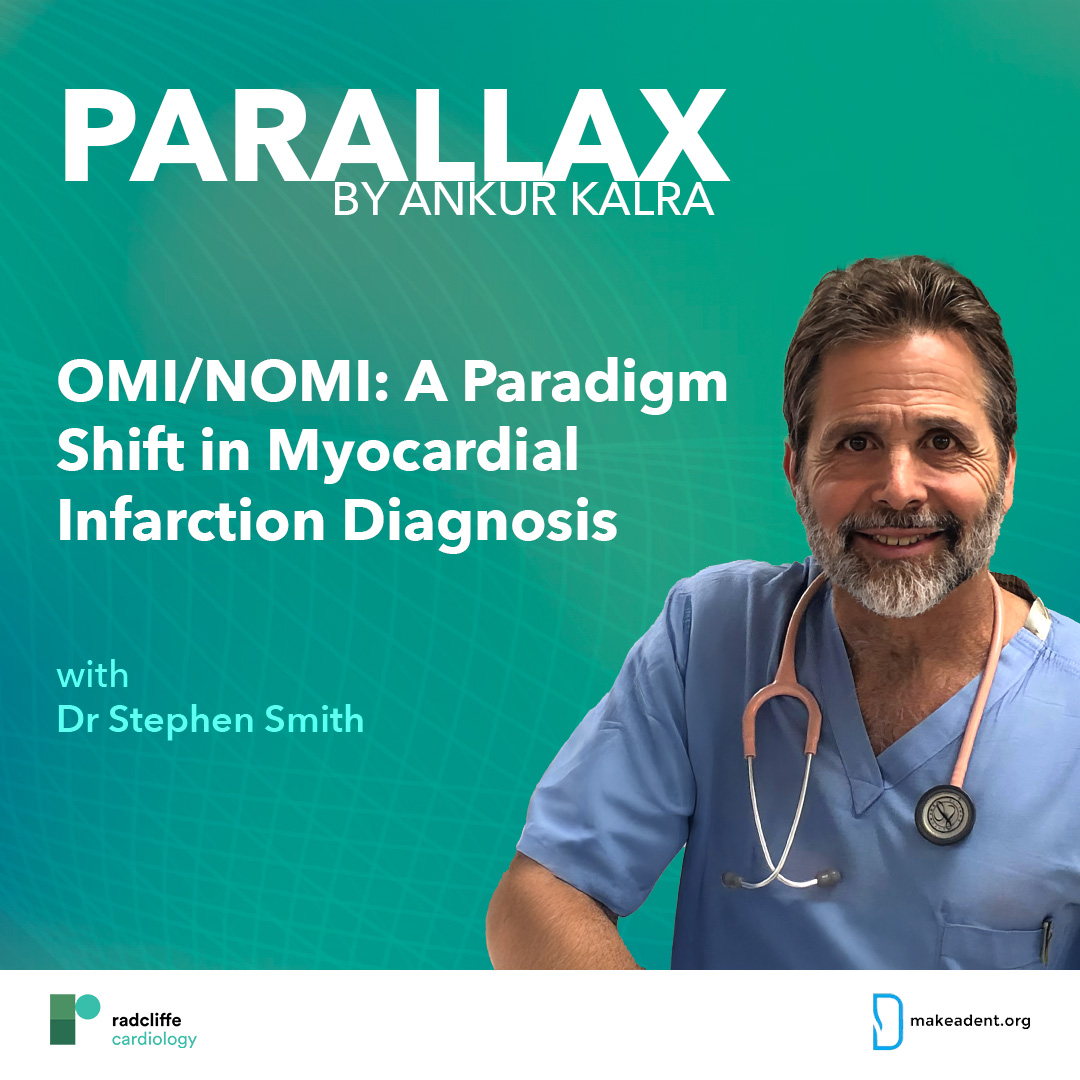
In this week's episode of Parallax, host Dr Ankur Kalra engages in a thought-provoking discussion with Dr Stephen Smith, a pioneer in electrocardiography and myocardial infarction diagnosis. They delve into the groundbreaking OMI/NOMI paradigm (Occlusion MI vs Non-Occlusion MI), challenging the traditional STEMI vs non-STEMI terminology that has long been the cornerstone of acute coronary syndrome management.
Dr Smith presents compelling evidence highlighting the limitations of ST-elevation as a marker for acute coronary occlusion, discussing his recently published review paper: "From ST-Segment Elevation MI to Occlusion MI: The New Paradigm Shift in Acute Myocardial Infarction".
The conversation explores the proposed shift to the OMI/NOMI terminology and the specific ECG criteria for diagnosing occlusion MI. Dr Smith discusses the challenges in disseminating this new paradigm and teaching these refined ECG interpretation skills to clinicians. Dr Kalra and Dr Smith explore exciting developments in AI-assisted OMI detection and ongoing studies aimed at validating the OMI/NOMI approach.
How can clinicians effectively implement the OMI/NOMI criteria into daily practice? What challenges exist in teaching these new ECG interpretation skills, and how can they be overcome? What advice does Dr Smith have for our listeners?
Sources:
McLaren J, et al. From ST-Segment Elevation MI to Occlusion MI: The New Paradigm Shift in Acute Myocardial Infarction. J Am Coll Cardiol Adv 2024;3:101314. DOI: 10.1016/j.jacadv.2024.101314.
Herman R, et al. Eur Heart J Digit Health 2023. International evaluation of an artificial intelligence–powered electrocardiogram model detecting acute coronary occlusion myocardial infarction. DOI: 10.1093/ehjdh/ztad010
Meyers HP, et al. IJC Heart & Vasculature 2021. Accuracy of OMI ECG findings versus STEMI criteria for diagnosis of acute coronary occlusion myocardial infarction. DOI: 10.1016/j.ijcha.2021.100767
Meyers HP, et al. J Emerg Med 2021. Comparison of the ST-Elevation Myocardial Infarction (STEMI) vs. NSTEMI and Occlusion MI (OMI) vs. NOMI Paradigms of Acute MI. DOI: 10.1016/j.jemermed.2020.10.026
Smith SW, Meyers HP. Ann Emerg Med 2023. Hyperacute T-waves Can Be a Useful Sign of Occlusion Myocardial Infarction if Appropriately Defined. DOI: 10.1016/j.annemergmed.2023.01.011
Meyers HP, et al. J Am Heart Assoc 2021. Ischemic ST‐Segment Depression Maximal in V1–V4 (Versus V5–V6) of Any Amplitude Is Specific for Occlusion Myocardial Infarction (Versus Nonocclusive Ischemia). DOI: 10.1161/JAHA.121.022866
Bischof JE, et al. Am J Emerg Med 2016. ST depression in lead aVL differentiates inferior ST-elevation myocardial infarction from pericarditis. DOI: 10.1016/j.ajem.2015.09.035
Smith SW, et al. Ann Emerg Med 2012. Diagnosis of ST Elevation Myocardial Infarction in the Presence of Left Bundle Branch Block using the ST Elevation to S-Wave Ratio in a Modified Sgarbossa Rule. DOI: 10.1016/j.annemergmed.2012.07.119
Meyers HP, et al. Am Heart J 2015. Validation of the modified Sgarbossa criteria for acute coronary occlusion in the setting of left bundle branch block: A retrospective case-control study. DOI: 10.1016/j.ahj.2015.09.005
Dodd KW, et al. Ann Emerg Med 2021. Electrocardiographic Diagnosis of Acute Coronary Occlusion Myocardial Infarction in Ventricular Paced Rhythm Using the Modified Sgarbossa Criteria. DOI: 10.1016/j.annemergmed.2021.03.036
de Alencar Neto JN, et al. Int J Cardiol 2024. Systematic review and meta-analysis of diagnostic test accuracy of ST-segment elevation for acute coronary occlusion. DOI: 10.1016/j.ijcard.2024.131889
de Alencar JN, et al. Br Heart J 2024. No false negative paradox in STEMI-NSTEMI diagnosis. Available at: https://scholar.google.com/citations?view_op=view_citation&hl=en&citation_for_view=ZBKuiKwAAAAJ:9wUeeRLfbNYC
Koyama Y, et al. Am J Cardiol 2002. Prevalence of coronary occlusion and outcome of an immediate invasive strategy in suspected acute myocardial infarction with and without ST-segment elevation. DOI: 10.1016/s0002-9149(02)02543-1
Khan AR, et al. Eur Heart J 2017. Impact of total occlusion of culprit artery in acute non-ST elevation myocardial infarction: a systematic review and meta-analysis. DOI: 10.1093/eurheartj/ehx418
Hung C-S, et al. Crit Care 2018. Prevalence and outcome of patients with non-ST segment elevation myocardial infarction with occluded "culprit" artery - a systemic review and meta-analysis. DOI: 10.1186/s13054-018-1944-x
Mehta SR, et al. N Engl J Med 2009. Early versus delayed invasive intervention in acute coronary syndromes. DOI: 10.1056/NEJMoa0807986
Kofoed KF, et al. Circulation 2018. Correction to: Early Versus Standard Care Invasive Examination and Treatment of Patients With Non-ST-Segment Elevation Acute Coronary Syndrome: VERDICT Randomized Controlled Trial. DOI: 10.1161/CIR.0000000000000640
Milosevic A, et al. J Am Coll Cardiol Cardiovasc Interv 2016. Immediate Versus Delayed Invasive Intervention for Non-STEMI Patients. DOI: 10.1016/j.jcin.2015.11.018
Lupu L, et al. Clin Cardiol 2022. Immediate and early percutaneous coronary intervention in very high-risk and high-risk non-ST segment elevation myocardial infarction patients. DOI: 10.1002/clc.23781


Chest pain is one of the most common reasons for an emergency room visit in the US, with almost 6 million ER visits annually, yet there is no consensus on how to compare the results from various hscTn assays. Tune in to hear Santiago outline the advantages and limitations of using hscTn as a standard biomarket to evaluate patients with suspected ACS in the ER.
Hosted by @AnkurKalraMD. Produced by @RadcliffeCardiology.

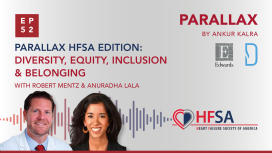
In this practical and insightful episode, Dr Kalra asks what does diversity, equity, inclusion and belonging mean to the editorial board of JCF and what were the steps taken to put these principles into practice.
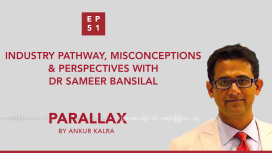
Dr. Bansilal was an Assistant Professor of Medicine at the Icahn School of Medicine at Mount Sinai when he decided to seek an alternative pathway to make an impact on patients’ lives.
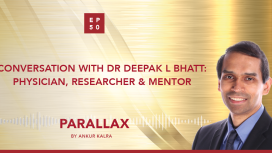
In the 50th episode of Parallax, Dr. Ankur Kalra’s guest is Dr. Deepak L. Bhatt leading physician, researcher, lecturer, and educator who has authored or co-authored over 1650 publications and was recipient of the ACC’s Distinguished Mentor Award in 2018 and AHA’s Distinguished Scientist Award in 2019.
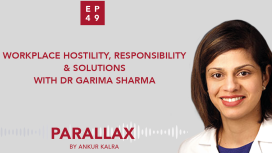
The American College of Cardiology surveyed cardiologists across the globe to have a more detailed understanding on the impact of hostility, discrimination, and harassment in the workplace. Of almost 6000 cardiologists who took part in the survey 44% reported hostile work environment.
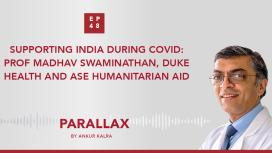
In this week's latest podcast episode, host, Ankur Kalra, MD, meets guest Prof Madhav Swaminathan (Duke University Health System, NC, US) to discuss how he has orchestrated a major humanitarian effort, in association with Duke University Health and The American Society of Echocardiography, to supply ventilation equipment and PPE to hospitals and NGOs during the current COVID-19 crisis in New Delhi, India.
Hear them discuss the challenges and learnings associated with the supply chain, inventory, logistics and cost to deliver this humanitarian effort; which most recently resulted in $140,000 of life-changing equipment being delivered to four key hospitals in New Delhi. A most inspirational episode.





